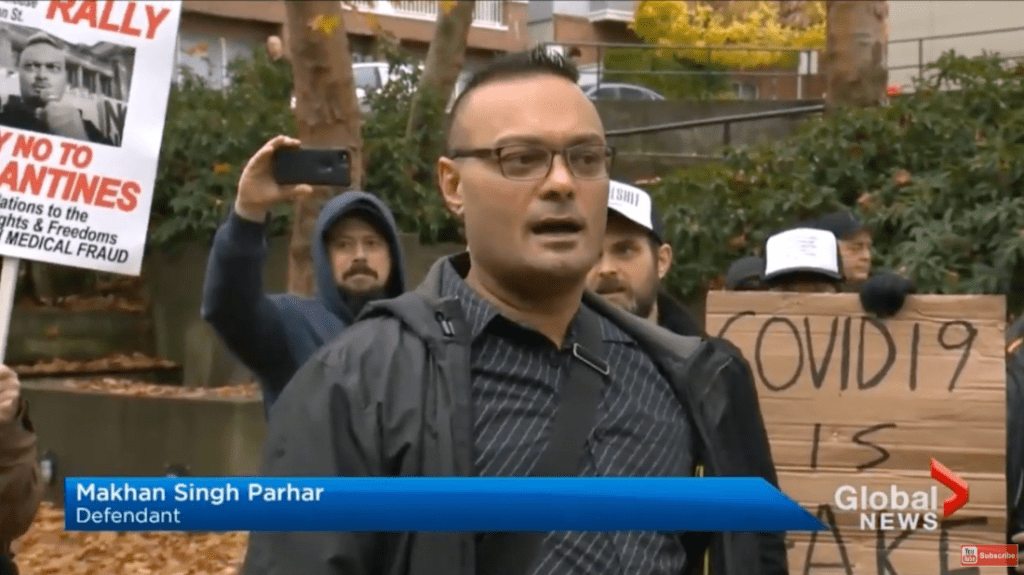This is the story of yet another COVID-19 denialist who finds himself absolutely shocked and outraged to learn that his actions have consequences.
British Columbia’s Mak Parhar, whom CBC News described as “a vocal member of both the Flat Earth conspiracy community and the anti-mask movement,” filed suit against the BC government, accusing them of kidnapping and committing terrorism against him after they jailed him for breaking federal quarantine laws.

After so many instances in which virtually every branch of the government apparatus has treated the anti-mask brigade with kid gloves, it’s delicious to see Supreme Court Justice Murray Blok having none of it, dismissing Parhar’s lawsuit as “vexatious,” “embarrassing,” and “an abuse of process.”
The truth is, Parhar has been making a pain of himself in Vancouver since the very beginning of the pandemic, when he had his business license suspended for failure to comply with COVID protocols. He encouraged clients to continue attending his hot yoga classes for immune-boosting benefits, telling them (incorrectly) that the “supposed virus” was unable to survive in the heat. Subsequently, he began using the studio as a COVID-denier meeting place. He courted more trouble that same spring with his efforts to videotape his unauthorized exploration of a local hospital’s COVID isolation area.
Fast forward to October 2020. Parhar crossed the border into the United States for Flatoberfest 2020, a flat-earth event held in Greenville, South Carolina. Upon returning to Canada, federal law required him to observe a 14-day quarantine. Parhar didn’t just blow off the self-isolation period; he actually bragged about it at a rally in Vancouver. He also boasted about taking off his face mask on the airplane and flummoxing a border agent by claiming he needn’t fill out quarantine paperwork because he wasn’t a person under the law.
Wait, what?
That claim might seem to come from nowhere, but CBC’s Bethany Lindsay has connected it to another idea popular in certain conspiracy theory circles, that of the “natural person” argument against paying income tax. It basically argues that, while the legal person represented by one’s Social Insurance Number (like a social security number) is a separate entity from the “natural person.” The former might be bound to follow the laws of the land and pay taxes, but the latter — having never consented to be subject to the law — does not.
It’s a false argument that has been rejected more than once in court, but that doesn’t seem to have stopped Parhar from attempting to apply it to COVID measures.
But it certainly didn’t get Parhar out of spending the better part of a week in jail, and that forms the basis for his lawsuit.
His civil claim paperwork is a fascinating artifact of an attempt to seek redress through the legal system even while rejecting all of that system’s fundamental conceits. Parhar — or, as he styles himself, “i:man:Mak of the Parhar family” — frequently strikes out the official language used in the document to replace it with his own interpretations. For instance, “plaintiff” becomes “a man,” and “personal injury” becomes “trespass.” He includes a liability notice that claims, in part:
The ‘Rules of civil procedure’ do NOT apply to man or woman or we the people;
The ‘Rules of civil procedure’ do NOT apply to ‘Parhar Court’;
The ‘Rules of civil procedure’ created by and for a private society [BAR members]
What exactly is ‘Parhar Court’? Your guess is as good as mine. Parhar claims it’s a “common law” court, and he seems pretty sure it’s going to allow him to place a public prosecutor, the New Westminster Chief of Police, and three Members of the provincial Legislative Assembly on trial.
It’s a testament to how seriously Justice Blok takes his work that the opinion he wrote on the case consisted of any more than just a single sentence: That’s not how any of this works.
Instead, Blok took the time to outline Parhar’s nigh-incomprehensible claims as best he could before describing them as displaying “the many hallmarks of OPCA litigation.” The Organized Pseudolegal Commercial Argument (OPCA) is a type of legal fallacy first identified by Alberta’s Justice J.D. Rooke, in which the litigant’s case rests on the idea that they are somehow exempt from the entire framework of the law:
These OPCA litigants deny state and Court authority. They generally believe that either the laws are in some way invalid or that they do not apply to most citizens, so they have a legal and moral right not to comply.
As Justice Rooke states: “they will only honour state, regulatory, contract, family, fiduciary, equitable, and criminal obligations if they feel like it. And typically, they don’t.”
Justice Rooke held that any scheme claiming that a person can possess or acquire a status that allows him or her to ignore Court authority is incorrect in law. He ruled that a defence with that basis may be struck without further analysis.
OPCA arguments have become fashionable during the pandemic as anti-mask and anti-lockdown protest groups seek to evade consequences for breaking the law. As vaccination becomes more widespread, we’re likely to see the anti-vax crowd jump on the bandwagon. Rooke’s recommended “strict approach” to this type of litigation couldn’t be more timely.
And Blok delivered: he summarily dismissed Parhar’s case as “patently absurd and nonsensical.”
It is difficult to understand how anyone could come to believe any of [this lawsuit’s] concepts… It is an abuse of process insofar as the plaintiff has filed his initiating document as an attempt not to litigate legitimately in this Court, but instead to utilize this Court’s infrastructure for the purposes of his fictional court.
To his credit, he graciously acknowledged that Parhar must be going through a tough time. It’s true that divorce is never easy, and Parhar has become completely divorced from reality. Says Blok:
I am not without sympathy for the plaintiff. He spent four days in jail, evidently the result of alleged breaches of the Quarantine Act, and it appears this occurred because someone convinced him, or he convinced himself, that statute law does not apply to him. It was a hard way to learn that laws do not work on an “opt-in” basis.
It’s a classy move to extend empathy to someone whose approach to the whole situation has been this level of off-the-wall. Blok notes that Parhar still has the opportunity to plead his case within the actual strictures of the legal system, and encourages him to do so “on more conventional grounds.”
Nonetheless, Parhar will have to reimburse the Attorney General of British Columbia’s costs in the amount of $750, a measure designed to ensure “that unsuccessful litigants understand that there is a risk to bringing an action.”
Actions have consequences.
(Screenshot via YouTube. Thanks to Richard for the link)




It’s Moving Day for the Friendly ..."
It’s Moving Day for the Friendly ..."
It’s Moving Day for the Friendly ..."
It’s Moving Day for the Friendly ..."